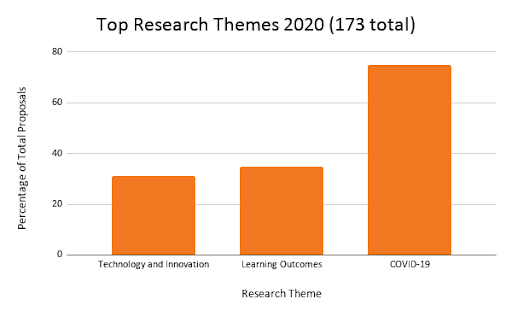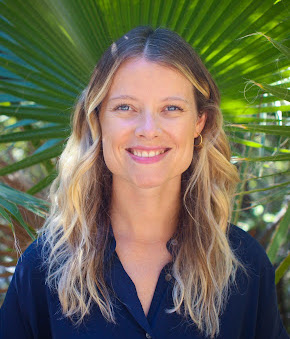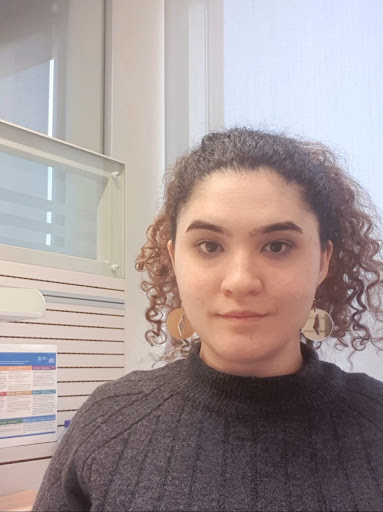Understanding EiE evidence needs: Lessons from the E-Cubed Research Fund and 2020 COVID-19 Evidence Gap Survey
INEE and Dubai Cares are excited to share E-Cubed proposal analytics from 2017-2020, as well as analysis from a 2020 survey of the INEE network on COVID-19 evidence gaps. Both of these sets of analytics seek to better understand and document evidence gaps in the field of education in emergencies (EiE). Trends reflected in these documents feed into the E-Cubed Research Envelope strategy, the INEE Learning Agenda, and more generally, the evidence strategies of both INEE and Dubai Cares.
The E-Cubed Research Fund aims to strengthen the evidence base in EiE, by supporting contextually relevant and usable research, and disseminating global public goods. Dubai Cares partnered with INEE in 2017 to design and manage this research envelope; INEE coordinates the proposal submission and review processes, while Dubai Cares makes final funding decisions. The fifth call for E-Cubed proposals (2021) is currently under review. Keep an eye out for funding announcements coming soon!
E-Cubed Analytics 2017-2020
We are pleased to share a new report that provides a summary and visualization of the analytics related to the E-Cubed research proposals received between 2017-2020, as well as analytics on funded projects. These analytics include research themes, contexts, organization types, and proposing office locations. We provide a summary of the report below.
Select analytics:
 Themes: The E-Cubed fund is structured to ensure that evidence gaps and needs are identified by the sector. Each year, proposals include a range of research themes. Considering the scope of EiE data, research themes are not exclusive categories. However the top emerging research themes in 2020 were COVID-19, Learning Outcomes, and Technology and Innovation.
Themes: The E-Cubed fund is structured to ensure that evidence gaps and needs are identified by the sector. Each year, proposals include a range of research themes. Considering the scope of EiE data, research themes are not exclusive categories. However the top emerging research themes in 2020 were COVID-19, Learning Outcomes, and Technology and Innovation.
Proposing office locations: Since 2017, INEE and Dubai Cares have increasingly prioritized proposals put forward by country-based researchers and institutions from within crisis-affected contexts or local actors in partnership with global organizations.
As visualized below, the percent of “international” applications has decreased from 2017 to 2020 from 52% to 12% while the percent of “country-based” applications has increased, originally from 47% dipping to 33% and back to 50% in 2020. The percentage of combination proposals has also increased over the years.

International (remote) refers to a proposing organization that is international and remote to the research context.
Combination refers to a proposal that includes applicants leading from both within the research context country(ies) and remote to the research context country(ies).
Funded research contexts: Research contexts for funded projects span scope and geographic location. A few projects have a global or regional scope while the remainder focus on 13 single country contexts in Sub-Saharan Africa, Latin America, Asia, and the Middle East.
2020 COVID-19 Evidence Gap Survey Analysis
In October 2020, INEE and Dubai Cares engaged the INEE Network in a survey on evidence gaps in light of COVID-19. The survey was disseminated and accessible in all five of INEE’s working languages (English, Arabic, French, Spanish, Portuguese). Data were collected over a three-week period via SurveyMonkey. In total, 286 responses were recorded across 86 countries.
Participants were asked about organizational priorities, what evidence has been useful in adapting their programs to COVID-19, key evidence gaps, desired evidence, and desired types of evidence/or research methods. See survey analytics, here.
Select analytics:
Evidence gaps & desired evidence: While practitioners have strived to ensure that the COVID-19-response is evidence-based, existing research and evidence is limited. Respondents identified evidence gaps in light of or compounded by the pandemic, as well as priorities for desired evidence to strengthen their response.

As donors award funding, researchers design studies, policy makers set strategic priorities, and practitioners implement programs, all stakeholders can consider the following expressed priorities:
- Effective distance learning strategies in relation to learning loss and learning outcomes;
- Understanding and ensuring equitable access to education prior to and during the pandemic, with particular emphasis on home learning resources, girls’ education, and children with disabilities; and
- Responding to the psycho-social and developmental needs of children and caregivers.
While these priorities are not mutually exclusive nor exhaustive of the expressed needs of survey respondents, these themes provide direction for stakeholders to build back more equitable and quality education systems.
Strengthening the evidence base to build back better
The above analytic snapshots are representative of an incredibly unique year. 75% of E-Cubed applicants in 2020 identified COVID-19 as a thematic area of focus for their research, and the top evidence gaps reported across the survey note areas that directly reflect evidence needs associated with COVID-19: Effective Distance Learning, Equitable Access, and MHPSS. Reported gaps and priorities would have arguably looked quite different pre-pandemic.
While the EiE sector had significant expertise and experience to draw on in how best to support education amidst a large-scale disruption, the reality persists that research in EiE remains underfunded, and that knowledge and evidence which exist are often programmatic in scope, not shared widely or in accessible formats, or research agendas are driven by donors and institutions in the Global North.
These snapshots help guide INEE and Dubai Cares in our efforts to strengthen the EiE evidence base vis-à-vis the E-Cubed Research Fund, the INEE Learning Agenda, and other projects by highlighting key gaps as identified by our members, especially those who have been affected by conflict and crisis.
Stay tuned - INEE and Dubai Cares look forward to continuing to share learnings and reflections from the E-Cubed Research Fund as well as updated analytics from 2021 proposals.
Acknowledgments
These reports have been prepared and reviewed by Sonja Anderson, INEE Data & Evidence Coordinator, Jonathan Kwok, INEE Data & Evidence Consultant, and Nadeen Alalami, Dubai Cares Programs Research Officer.
INEE would like to thank Dubai Cares for their continued championing of evidence for EiE and commitment to funding research that is truly driven by evidence gaps and needs as identified by people and institutions in crisis-affected contexts.
We invite you to interact with these analytics and share any feedback or observations! For questions please reach out to Sonja Anderson - [email protected].
-------
Authors:

Jonathan Kwok, INEE Evidence Consultant - Jon supports INEE’s work on curating and strengthening the EiE evidence base. He is pursuing a Master’s degree in International Educational Development with a concentration in International Humanitarian Issues at Teachers College, Columbia University. He holds a BA in International Studies from Pepperdine University. He has over three years of experience working with multiple EiE and development organizations at both global and local levels in multiple countries. He is currently based in New York, USA.
 Sonja Anderson, INEE Data & Evidence Coordinator - Sonja is responsible for INEE's work on curating and strengthening the EiE evidence base. She coordinates the various evidence workstreams within INEE. She also manages the E-Cubed Research Fund, including the call for proposals, the designation of eligibility and criteria, and the proposal review process. Sonja received her M.Ed. from the Harvard Graduate School of Education in International Education Policy and holds a BA in International Relations from the University of San Francisco. She has six years of experience in the field of EiE. She is based in Seattle, USA.
Sonja Anderson, INEE Data & Evidence Coordinator - Sonja is responsible for INEE's work on curating and strengthening the EiE evidence base. She coordinates the various evidence workstreams within INEE. She also manages the E-Cubed Research Fund, including the call for proposals, the designation of eligibility and criteria, and the proposal review process. Sonja received her M.Ed. from the Harvard Graduate School of Education in International Education Policy and holds a BA in International Relations from the University of San Francisco. She has six years of experience in the field of EiE. She is based in Seattle, USA.
 Nadeen Alalami, Research Officer, Dubai Cares - Nadeen manages a diverse portfolio of Dubai Cares’ research and advocacy programs, with a focus on education in emergencies (EiE). She manages the E-Cubed research envelope, a USD 10 Million research fund which aims to strengthen the evidence base in EiE, by supporting contextually relevant and usable research, and disseminating global public goods. Nadeen holds a BA in Psychology from New York University Abu Dhabi. She has five years of experience in the field of EiE. She is based in Dubai, UAE.
Nadeen Alalami, Research Officer, Dubai Cares - Nadeen manages a diverse portfolio of Dubai Cares’ research and advocacy programs, with a focus on education in emergencies (EiE). She manages the E-Cubed research envelope, a USD 10 Million research fund which aims to strengthen the evidence base in EiE, by supporting contextually relevant and usable research, and disseminating global public goods. Nadeen holds a BA in Psychology from New York University Abu Dhabi. She has five years of experience in the field of EiE. She is based in Dubai, UAE.



